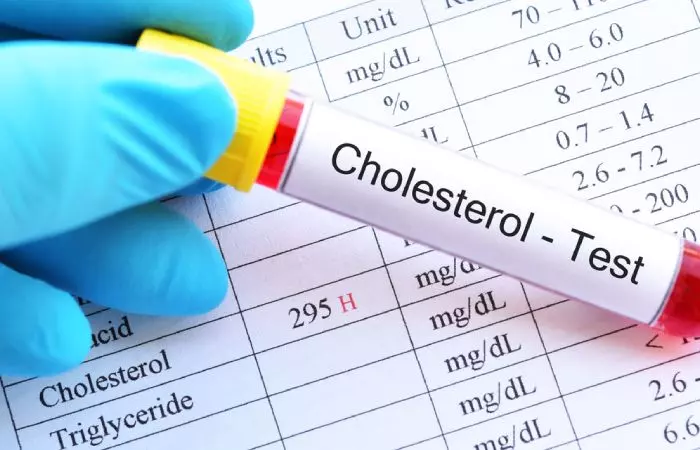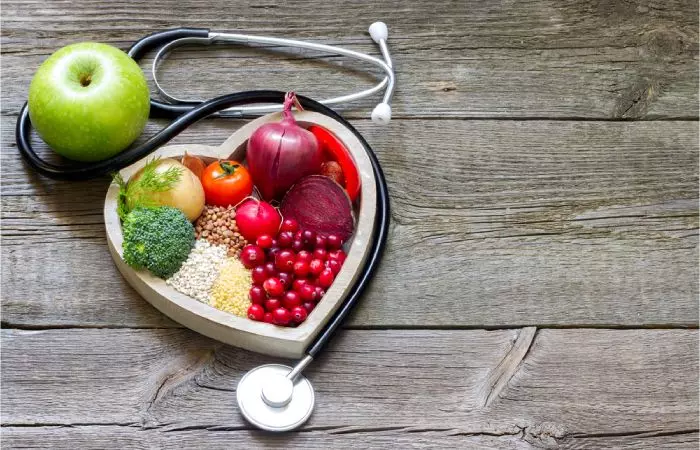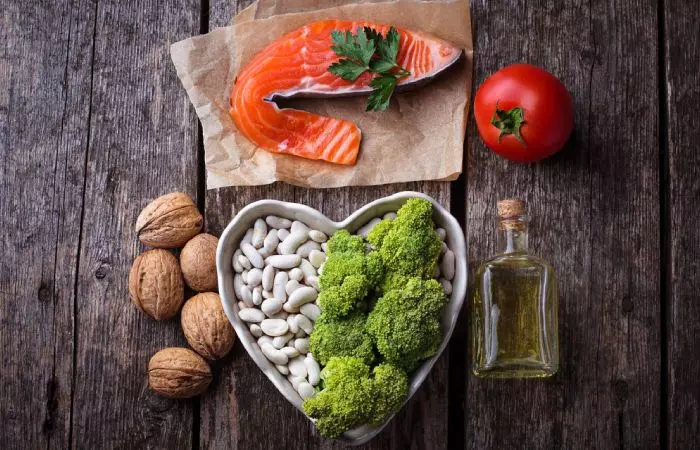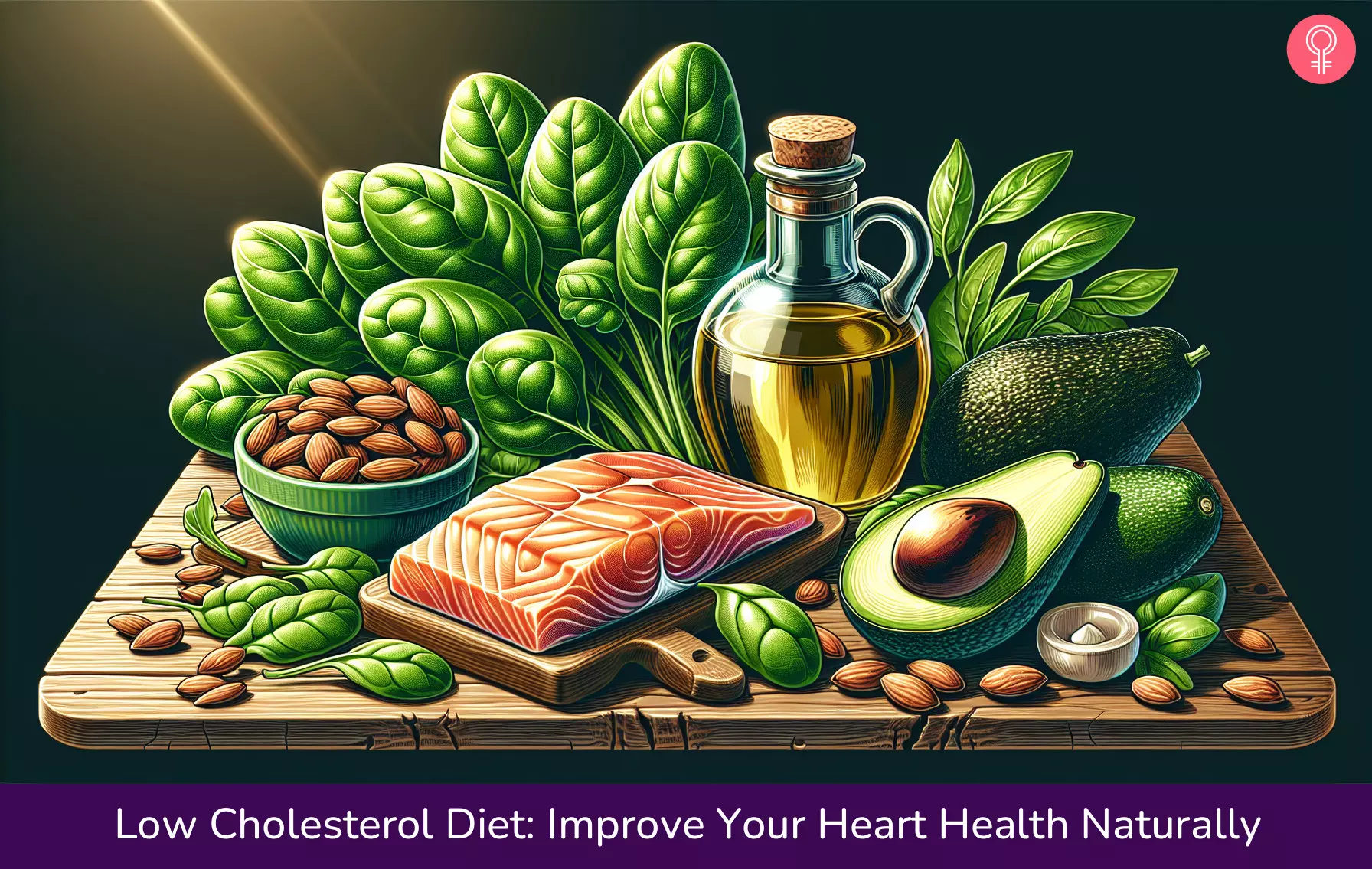What Is Cholesterol?
Cholesterol is a fatty, waxy substance found in the cells of our bodies that essentially aids various physiological functions, such as forming cell membranes, producing hormones (like estrogen and testosterone), and improving digestion. Cholesterol is carried by lipoproteinsi Particles made of proteins and fats that carry cholesterol through the bloodstream to your cells. in the blood, and is of two types: low-density lipoprotein (LDL), also called bad cholesterol, and high-density lipoprotein (HDL), also known as good cholesterol. While cholesterol is not inherently bad and is necessary in some amount for good health, excessive levels of LDL cholesterol have been associated with the formation of plaque that blocks the arteries, restricting blood flow and increasing the risk of heart disease and strokei Damage caused to the brain due to the interruption in its blood supply or when a blood vessel in the brain ruptures. (1). While good levels of HDL cholesterol may lower the risk associated with heart diseases. So maintaining a healthy balance of cholesterol through diet and lifestyle is crucial for overall well-being. After understanding what exactly cholesterol is, let’s check out the factors responsible for high cholesterol, in the next section.
Causes Of High Cholesterol
High cholesterol is a condition characterized by elevated levels of low-density lipoprotein (LDL) cholesterol in the blood. According to the CDC, 86 million US adults have cholesterol levels above 200 mg/dl, considered to be high (2). High cholesterol does not have any symptoms, so it is important to get regular blood tests done to check your cholesterol levels. The factors that may attributed to high cholesterol are as follows: As we have explored the various causes of high cholesterol, it is evident that our lifestyle and dietary choices play a crucial role. So let’s delve deeper into understanding how diet can impact cholesterol.
Does Your Diet Impact Your Cholesterol?
Absolutely, your diet has a significant impact on your cholesterol levels (3). The foods you consume can directly influence the levels of LDL (bad) cholesterol and HDL (good) cholesterol in your bloodstream. According to widely accepted theories, high saturated and trans fati Type of dietary fat which is unhealthy, often found in commercial baked goods, frozen and processed fast food. food can increase low-density lipoprotein (LDL) cholesterol in your bloodstream. Conversely, a diet rich in soluble fiber, unsaturated fats, and plant sterols may help lower LDL cholesterol. Consuming oily fish, like salmon, and nuts can raise high-density lipoprotein (HDL) cholesterol, removing excess cholesterol from your body. So making informed dietary choices is a fundamental step in managing and improving your cholesterol. Now that we have established the significant role of diet in cholesterol management, let’s understand the key nutritional source of it to make informed dietary decisions!
What Is The Major Nutritional Source Of Cholesterol?
The major nutritional source of cholesterol in your diet comes from animal-based foods (9). Foods like meat, poultry, eggs, and dairy products are rich in dietary cholesterol. Among these, egg yolks notably have a high cholesterol content. However, it is crucial to recognize that saturated and trans fats, found in many animal-based products, may have a significantly higher impact on blood cholesterol levels. Mary adds, “Cholesterol in foods is not the cause of high cholesterol in the body and is not how you lower body cholesterol. It is mainly sugar/high carbohydrates and trans fats that increase our cholesterol levels” To promote heart health, it’s advisable to limit the consumption of high-saturated-fat foods, sugar, carbs, and processed foods that contain trans fats, and opt for lean protein sources and plant-based alternatives that support better cholesterol profiles.
Best Proven Diets To Lower Cholesterol
Several types of diet have been proven to effectively reduce cholesterol and risk of heart disease. So here are some of those diets: Now that we have explored the best and most effective diets designed to lower cholesterol levels, let’s look deeper into the practical side of things by answering the fundamental question of how to lower cholesterol with the right diet.
How Can I Lower Cholesterol With Diet?
Lowering cholesterol through a diet plan involves making specific dietary choices and adopting healthier eating habits. Here are some effective ways to lower cholesterol through your diet: Apart from making these lifestyle changes, you may also follow a low-fat diet. Such a diet not only helps you lose weight but focuses on reducing your saturated fat intake, which may help lower bad cholesterol levels in your body. Having explored the dietary changes that can help lower cholesterol levels, let us embark on a journey to discover a palette towards discovering healthy low cholesterol foods!
Healthy Low Cholesterol Foods
To make informed dietary choices, it’s important to know about healthy low cholesterol food items, so here is the list: Having explored the array of nutritious foods that help lower cholesterol levels, it’s equally important to understand the flip side of the coin. By understanding the food to avoid to lower cholesterol!
Foods To Avoid To Lower Cholesterol
To lower cholesterol levels, avoid or limit these high-cholesterol and artery-clogging foods: Now that we have identified the dietary culprits to steer clear of for better cholesterol management, it’s time to create a roadmap to heart-healthy eating by embarking on a journey into crafting an effective low cholesterol diet meal plan!
Low Cholesterol Diet Meal Plan
Low cholesterol diet plan depends on individual preferences, dietary needs, and calorie goals, so it’s essential to customize it according to your needs. So here is a sample 7-day meal plan for low cholesterol diet: With our low-cholesterol diet meal plan in hand, it’s time to step into the kitchen and bring these heart-healthy choices to life. So find some cooking tips in the next section to help you prepare delicious, cholesterol-friendly meals with ease!
Salad with a cup of lettuce, tomatoes, cucumbers, and 1 tablespoon of balsamic vinaigrette, 3-4 oz of grilled chicken breast, and 1/2 cup of quinoa.
Snack
1 small carrot with 2 tablespoons of hummus.
Dinner
Baked salmon (3 oz) with a squeeze of lemon. Steamed broccoli (1 cup) with 1/2 a cup of brown rice.
Lentil soup (1 cup) with a side salad of 1 cup of mixed greens, bell peppers, and a tablespoon of vinaigrette dressing. A cup of tofu scramble.
Snack
A handful of mixed nuts (almonds, walnuts, and pistachios).
Dinner
Grilled tofu (4 oz) with a cup of stir-fried vegetables, bell peppers, broccoli, and snap peas in 2 tablespoons of low-sodium soy sauce. 1/2 cup of quinoa.
1 turkey lettuce wrap with 1 cup of mixed vegetables (such as bell peppers, cucumbers, and carrots), ½ cup of lettuce, and tomatoes. 1 slice of avocado 1 apple (sliced)
Snack
1 cup air-popped popcorn.
Dinner
1 serving of baked chicken (4 oz) with 1 medium sweet potato and 1 cup steamed green beans.
3-4 oz of grilled chicken breast with a side of 1 ½ cup of grilled vegetables (zucchini, eggplant, and bell peppers).
Snack
½ cup cottage cheese with ½ cup pineapple chunks.
Dinner
1 serving of grilled shrimp (4 oz) with ½ cup quinoa and asparagus (1 cup)
1 portion of chickpea salad with 1 cup of mixed greens, cherry tomatoes, cucumber, and 1 tablespoon of balsamic vinaigrette.
Snack
Handful of mixed nuts (almonds, walnuts, cashews).
Dinner
Baked fatty fish (4 oz) with ½ cup brown rice and 1 cup roasted vegetables (broccoli, carrots, cauliflower).
1 whole grain tortilla filled with 2 tablespoons of hummus and 1 cup of slices cucumber, lettuce, and bell peppers.
Snack
½ cup mixed berries
Dinner
4 oz grilled chicken breast marinated in 2 teaspoons of herbs and lemon juice with 1 cup mix of bell peppers, zucchini, and onions.
1 cup of chickpeas mixed with 1 diced avocado, ½ cup cherry tomatoes, red onion, and cilantro. Dressed with 1 tablespoon of lime juice and olive oil.
Snack
¼ th cup mixed nuts (almonds, cashews, pistachios)
Dinner
1 grilled veggie burger with a patty made from ½ cup black beans and quinoa, served with ½ cup of lettuce and tomato. 1 medium-sized sweet potato, cut into wedges and baked.
Cooking Tips To Help
Here are some cooking tips that help you cook delicious meals that support you in your journey towards a healthy heart:
Use olive, canola, or avocado oils instead of butter or lard to reduce saturated fat. Bake, smoke, grill, or broil proteins like chicken and fish instead of pan or deep frying them to minimize added fats and discard fats that drain out while cooking them. Enhance the flavor of your dishes with herbs and spices rather than relying on excessive salt for seasoning. Choose lean cuts of meat, poultry, and fish to reduce saturated fat intake. Use low-fat or fat-free dairy products and be mindful of cheese portions. Cook vegetables with minimal oil to preserve their nutritional value. Check food labels for hidden sources of cholesterol, saturated fats, and trans fats. Modify recipes to reduce cholesterol-laden ingredients like egg yolks or excessive butter. Incorporate tofu, tempeh, and legumes into your meals as meat substitutes to cut down on saturated fat.
Does garlic lower cholesterol? Garlic may have a modest impact on lowering cholesterol levels, particularly LDL cholesterol, due to its potential to reduce blood clotting and inflammation (28). Is Rice high in cholesterol? No, rice itself is not high in cholesterol, but it has a high glycemic index and excess consumption of rice may increase LDL levels. Moreover, the preparation and accompanying ingredients can influence the overall nutritional content of a rice-based dish. For example, fried rice cooked with eggs and high-saturated-fat oils may contribute to higher cholesterol levels. Are potatoes bad for cholesterol? Potatoes themselves are not inherently bad for cholesterol. They are a low-fat, plant-based food and do not contain cholesterol. However, the cooking methods used to prepare them can impact their effect on cholesterol. For example, deep-frying potatoes to make French fries can increase cholesterol levels. Can lemon juice reduce cholesterol? Lemon juice alone is not a proven method for significantly reducing cholesterol levels. While some studies suggest that citrus fruits like lemons may have a modest impact on cholesterol due to their high vitamin C and antioxidant content, the effect is generally minimal (28). What is a normal cholesterol level? A normal cholesterol level can vary slightly but the following values are considered typical: -Total Cholesterol: Less than 200 milligrams per deciliter (mg/dL) is considered desirable. -LDL Cholesterol (Low-Density Lipoprotein): Less than 100 mg/dL is optimal for individuals at low risk of heart disease. For those at higher risk, such as people with diabetes or a history of heart disease, a target of less than 70 mg/dL may be recommended. -HDL Cholesterol (High-Density Lipoprotein): Higher levels are better. An HDL level of 60 mg/dL or higher is considered protective against heart disease. -Triglycerides: Less than 150 mg/dL is considered normal. However, lower levels are generally better. Can a low cholesterol diet be effective for weight management? Yes, a low cholesterol diet can be effective for weight management because it often emphasizes whole, nutrient-dense foods that are filling and lower in calories, promoting weight loss when combined with portion control and physical activity.
Illustration: Low Cholesterol Diet: Improve Your Heart Health Naturally
Learn about the low cholesterol diet in this quick video. It helps you understand which foods to savor and which ones to skip for better cholesterol levels and overall heart health.











